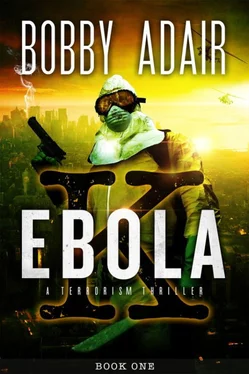“Sounds like a no. You probably don’t have anything to worry about.” Dr. Wheeler’s confidence was about as infectious as the disease.
“I know.”
“But here you are. And asking questions for a reason.”
Olivia looked away. “Yes.”
“Do you know how many people died last year of malaria?”
She rolled her eyes and ventured a guess. “Eleven?”
Dr. Wheeler laughed. “Dishing it back out. Okay.” He put on a serious face. “Over six hundred thousand. How many died of the Ebola virus last year?”
“None,” Olivia answered right away.
“So you’ve done some homework. How about the year before that?”
“Fifty-one.”
“How many in the history of the disease? If you don’t get this one right, I’ll know you weren’t listening during my presentation.”
Olivia said, “I was so taken with your charm that I didn’t catch a single word.”
“When you use that much sarcasm, it actually hurts my feelings.”
“I’m guessing it just bounces off a deeper layer of ego.” Olivia smiled. “Maybe sixteen hundred died of Ebola. The point I guess you’re making is that Austin’s chances of dying of another infectious disease like malaria are higher than they are of dying from Ebola.”
“Astronomically higher,” Dr. Wheeler said. “A person can get malaria from a mosquito bite just for going fishing in the wrong spot. You almost have to go out of your way to get Ebola.”
“But thirteen hundred cases have been reported in West Africa, and not only is the number increasing, but the curves are becoming steeper. If you graph the number of cases over time, the curve appears to be exponential.”
“You have done your homework. And you apparently paid attention during your Algebra classes.” Dr. Wheeler smiled slyly. “Tell me, why do think that is?”
“Because I liked to be prepared.”
“No, I mean, why is Ebola spreading rapidly?” he asked.
“Poor hygiene. Limited availability of medical facilities—”
Dr. Wheeler cut in, “And little trust of the medical infrastructure that exists.”
“—cultural norms,” she continued.
“Like eating undercooked bush meat. You know certain species of bats are Ebola reservoirs, right?”
Olivia nodded.
“Of course,” Dr. Wheeler went on. “You know if people expose themselves to infected flesh, they risk infection themselves. And people there don’t have the same cultural inhibitions against eating bats, monkeys, rodents, or anything else they can toss over the fire. Africa isn’t anything like Atlanta. We can run down to the grocery store when we get hungry. For most Africans, it’s not that simple. You eat what you can get.”
“I know that.” Olivia didn’t need a lesson on the different levels of affluence around the world.
“Sorry. I’m just making my point.”
“Which is?” Olivia asked.
“Ebola is transferred through bodily fluids. That’s it.”
“There was that test with the pigs and monkeys,” Olivia countered.
“Yes, but pigs give off more aerosolized particles than pretty much any other species.” Dr. Wheeler pantomimed a gesture to emphasize the point. “A repeat of that study with macaques failed at getting a primate-to-primate transmission. Infected monkeys on one side of the room, clean monkeys on the other. Same setup as with the pigs. The infected monkeys died. The clean monkeys stayed clean and went on to live happy little monkey lives.”
“Happy monkey lives as test animals ?”
“You never know, maybe they’re testing the addictive effects of long-term Viagra use right now.”
Olivia giggled. Wheeler laughed.
Olivia looked over her shoulder at the open conference room door, feeling slightly self conscious but not sure why. “But the Ebola virus could mutate.”
“Are you trying to get worked up about this?”
Olivia chose not to answer the question.
Dr. Wheeler leaned forward again, put his elbows on his desk, and scrutinized Olivia for a moment. “Yes. The virus could mutate. And before you ask, yes, viruses mutate all the time. I suspect not always for the better—better for the virus, I mean. You know mutation is a random process, although it seems like it’s not. Natural selection is not random. Once a mutation occurs, nature decides whether it is better or worse for the organism. The vast majority of the time, it’s not. The odds of this Ebola outbreak mutating to become more contagious are astronomically small. Don’t worry so much.”
“Sorry, Dr. Wheeler.”
“Your brother will probably be fine. As long as he follows some basic guidelines, he’ll come back from Africa healthy. If he comes back with a disease of some sort, the odds are it’ll be something other than Ebola.”
“What’s this about Ebola?”
Both Olivia and Dr. Wheeler looked toward the voice coming from the open door.
Dr. Wheeler waved Dr. Gonzalez in to join them. “Olivia, this is Dr. Gonzalez, one of my coworkers at the CDC. Dr. Gonzalez, this is Olivia Cooper. She was at my presentation and acknowledges that this is an NSA building, without admitting that she works here.”
Olivia spun in her chair to face Gonzalez and extended a hand. “Pleased to meet you.”
Dr. Gonzalez pulled away from Olivia.
Dr. Wheeler said, “He’s a germophobe.”
“Careful is a better word,” said Dr. Gonzalez.
Wheeler said, “Olivia and I were talking about her brother. He’s in Uganda this summer. I was telling her that he’s probably safe from the Ebola outbreak. As you know the outbreak is in West Africa. Uganda is pretty far from there.”
Dr. Gonzalez seated himself on the same side of the table as Olivia, but left an empty chair between them, fussily arranging his computer bag on the conference table. “Uganda. Where?”
“Um,” Olivia thought about it for a minute. “A little farming town. It’s…uh…Kapchorwa?”
“Never heard of it,” said Gonzalez. “Wheeler, open up a map of Africa on your computer.”
Wheeler rolled his eyes and winked at Olivia.
“I saw that,” Gonzalez said. “I’m eccentric, not oblivious.”
“Right.” Wheeler manipulated the mouse and typed. A few seconds later, he turned the computer sideways on the conference table so that everyone could see the screen.
Olivia leaned forward.
Gonzalez leaned back.
“Zoom in over here.” Olivia pointed.
Wheeler did as instructed and zoomed the map in on the eastern half of the country.
Olivia leaned in a little further and pointed to a spot just above a big blob of green. “That’s it there, just north of that park.” She sat back.
Gonzalez leaned forward. “Zoom out, Wheeler.”
Dr. Wheeler fiddled with the wheel on his mouse. “That’s Mt. Elgon National Park.”
Dr. Gonzalez sighed.
Olivia looked at Dr. Gonzalez, who said nothing to elaborate. She looked at Wheeler. He was wearing his poker face. Olivia frowned and looked back at Gonzalez. “What?”
The doctor opened his mouth to speak as Dr. Wheeler cut him off. “Olivia, before you listen to him, you need to know a quarter million people—maybe more—live within a dozen miles of the base of that mountain.”
She looked at Gonzalez. “What? You sighed dramatically like Austin’s in Godzilla’s backyard.”
Dr. Gonzalez pulled a face. “I thought Austin was in Texas.”
With a dramatic eye roll, Olivia said, “My brother’s name is Austin, Austin Cooper. Now tell me what’s wrong? Why the sigh?”
Dr. Gonzalez seemed to think about Olivia’s request for a moment as his face went through changes of expression. “You’ve heard of the Marburg virus?”
Читать дальше












